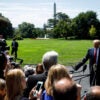The Air Force’s new Long-Range Strike Bomber (LRS-B) can evade most high-tech air defenses, but it’s having a tough time escaping the military’s budget woes. If it can’t avoid cuts, this key component in the nuclear triad—and national security—will be compromised.
At $550 million per aircraft, the LRS-B is much cheaper than its aging predecessors, the B-52, the B-1B, and the B-2 stealth bomber, and packs a greater punch in terms of firepower, payload, and flight range. However, the tightening defense budget is forcing the Air Force to cut crucial technologies.
Several planned capabilities for the LRS-B have already been scrapped, including cyber defenses, advance surveillance sensors, and the ability to be converted to an unmanned spy aircraft. Limiting the bomber’s capabilities to save money will cost the U.S. much more in terms of national security.
“In the future, what our president is going to need is options, options to project power anywhere in the world within hours,” said Major General Steve Kwast, who is charged with helping shape the Air Force’s long-term strategy. “This Long-Range Strike Bomber is going to be that option the president can use when there are no other options.”
The interoperability of the LRS-B makes it an essential part of the nuclear triad—which also includes the Intercontinental Ballistic Missile (ICBM) and the nuclear ballistic missile submarine (SLBM). However, in an effort to build the new bomber as fast as possible the Air Force has delayed certifying the LRS-B to conduct nuclear missions, putting more pressure on the older, less-capable bombers.
While some critics argue that the triad is an outdated and expensive relic of the Cold War or that the U.S. can still maintain a sufficient nuclear deterrent with a monad or dyad, The Heritage Foundation and others agree that it is time to modernize and revitalize the nuclear triad.
“The central role of our nuclear deterrent triad is to keep any crisis from escalating to a nuclear conflict,” President of GeoStrategic Analysis Peter Huessy wrote. “That requires a credible, stable and effective deterrent triad. Each successive administration from Eisenhower to the present, through 70 years of nuclear history, has so concluded.”
America is the only nuclear power in the world without a robust modernization program; Russia and China have been refining and expanding their nuclear capabilities for years.
As threats emerge, a credible and complete nuclear triad—including a fully capable Long-Range Strike Bomber—is necessary for ensuring U.S. national security and the safety of our allies.
Clark Irvine is currently a member of the Young Leaders Program at The Heritage Foundation. For more information on interning at Heritage, please click here.






























